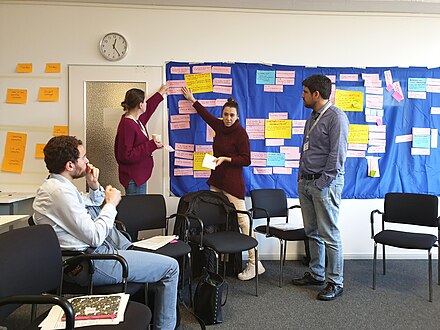Strategy/Wikimedia movement/2018-20/Reports/Movement Strategy Playbook/Normalize learning and improvement
| “ | Have a rhythm for reflection
and small improvements. |
” |
Any iterative process thrives on having regular moments to pause, surface learning, and make small improvements together. Scheduling these reflective practice sessions (sometimes called “after action reviews,” “retrospectives,” or “tuning sessions”), and making them a regular, predictable ritual is crucial. Without this, you risk all of the chaos and agile or “adaptive” processes — without the benefits.

Schedule regular reflective practice
edit- “You need to include milestones into the project for design iteration — explicit 'pause' moments to focus and shift. And you need to schedule them in up front.”
- “There have to be moments of slowing down and reflection built into your weekly rhythm, if you want to have thoughtful, constructive communications across your team.”
- “To be effective [with reflective practice], you have to plan it out and make intentional time and space for it — as opposed to iteration as a reactive scramble. A lot of knowledge was lost because we lacked this reflective ‘lessons learned’ culture.”
Focus meetings on learning instead of status updates (eg, “what we learned” vs. “what we did”)
edit- “A lot of our team meetings were focused on ‘status updates’ — but that’s about sharing information, as opposed to sharing knowledge. It’s the difference between: "Here's what I did" (information) versus "here’s what I learned” (knowledge).
- “You need to create a culture of sense-making. A space where debate and dissent and different and opposition is invited, so that we can look at things from a different perspective. It’s about surfacing trends, patterns, dissenting voices, things that gave you pause.”
Tools and examples for reflecting
editDo you have tools, methods or ideas that you, your community or organization use for this? Add them to this section for others to see.